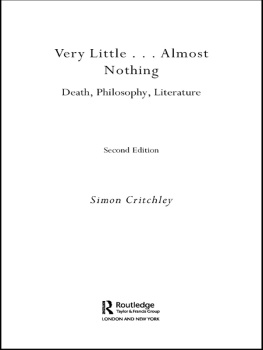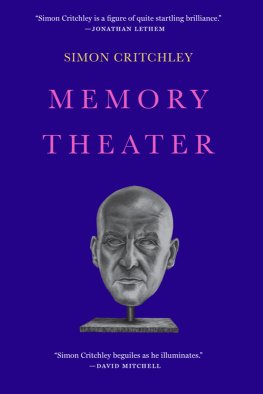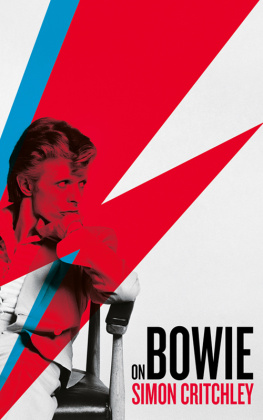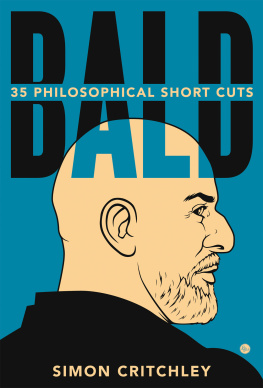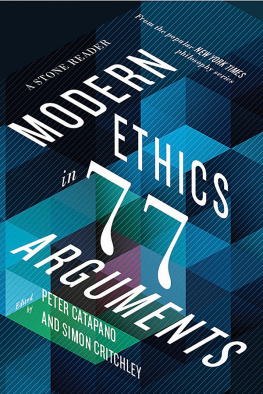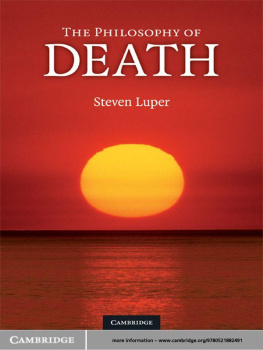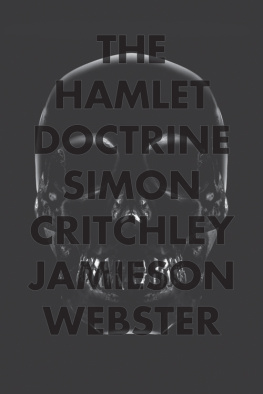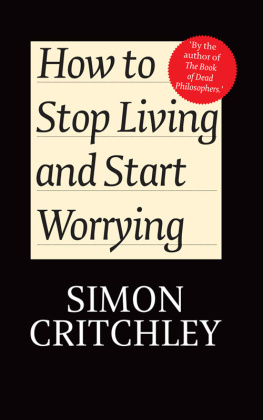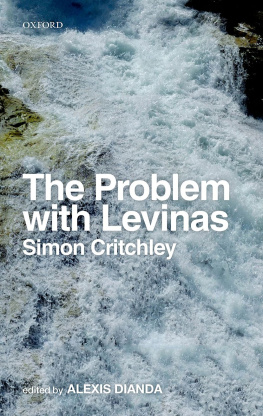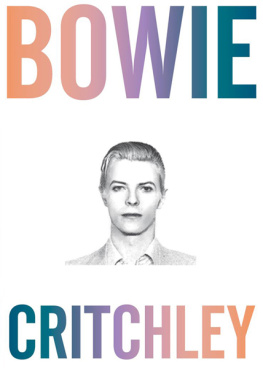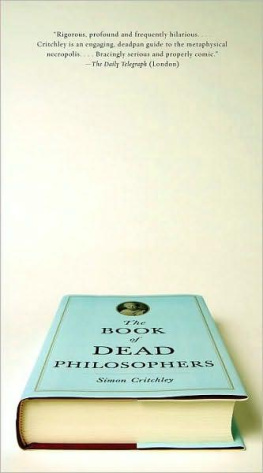Critchley - Very little-- almost nothing : death, philosophy, literature
Here you can read online Critchley - Very little-- almost nothing : death, philosophy, literature full text of the book (entire story) in english for free. Download pdf and epub, get meaning, cover and reviews about this ebook. City: London, New York, year: 1997, publisher: Routledge, genre: Science. Description of the work, (preface) as well as reviews are available. Best literature library LitArk.com created for fans of good reading and offers a wide selection of genres:
Romance novel
Science fiction
Adventure
Detective
Science
History
Home and family
Prose
Art
Politics
Computer
Non-fiction
Religion
Business
Children
Humor
Choose a favorite category and find really read worthwhile books. Enjoy immersion in the world of imagination, feel the emotions of the characters or learn something new for yourself, make an fascinating discovery.
Very little-- almost nothing : death, philosophy, literature: summary, description and annotation
We offer to read an annotation, description, summary or preface (depends on what the author of the book "Very little-- almost nothing : death, philosophy, literature" wrote himself). If you haven't found the necessary information about the book — write in the comments, we will try to find it.
Very little-- almost nothing : death, philosophy, literature — read online for free the complete book (whole text) full work
Below is the text of the book, divided by pages. System saving the place of the last page read, allows you to conveniently read the book "Very little-- almost nothing : death, philosophy, literature" online for free, without having to search again every time where you left off. Put a bookmark, and you can go to the page where you finished reading at any time.
Font size:
Interval:
Bookmark:
This is a very brave book it makes philosophical conversation possible again after two decades of pragmatist intolerance. Roger Poole, Parallax
(T)his is an often beautifully written philosophical act of mourning. It also commands respect because it obliges one to examine the fictions one employs to avoid really doing philosophy. Critchleys steadfastly post-Kantian rejection of theological answers to the questions he asks is very welcome. Andrew Bowie, Radical Philosophy
Very Little Almost Nothing manages with some aplomb, to pull off the extraordinarily difficult task of saying something new and interesting about Beckett and Blanchot. Martin McQuillan, New Formations
Critchley keeps his writings for the most part powerful and elegant, wide-ranging but well-focussed. The book is at all times sibylline, moving, insightful, explorative. Colin Davis, French Studies
Altogether beautifully written, with rich and deep insights. It is the most original and enlightening book I know about the so-called nihilism of present times and its genealogy and a key book for the understanding of the contemporary condition of man. Michel Haar, Universit de Paris
Very Little Almost Nothing is a profound but secular meditation on the theme of death, putting the question of the meaning of life back at the centre of intellectual debate. Simon Critchley traces the idea of nihilism from Jena Romanticism to Cavell and Blanchot, culminating in a reading of Beckett, in many ways the hero of the book. This second edition has added a revealing new preface, and a new chapter on Wallace Stevens which reflects on the idea of poetry as philosophy.
Simon Critchley is Professor of Philosophy at the New School for Social Research, New York and at the University of Essex, and Directeur de Programme, College International de Philosophie, Paris. He is author and editor of many books including The Ethics of Deconstruction and On Humour (also published by Routledge).
Second Edition

First published 1997
by Routledge
11 New Fetter Lane, London EC4P 4EE
Simultaneously published in the USA and Canada
by Routledge
29 West 35th Street, New York, NY 10001
Second edition published 2004
Routledge is an imprint of the Taylor & Francis Group
This edition published in the Taylor & Francis e-Library, 2004.
1997, 2004 Simon Critchley
All rights reserved. No part of this book may be reprinted or reproduced or utilized in any form or by any electronic, mechanical, or other means, now known or hereafter invented, including photocopying and recording, or in any information storage or retrieval system, without permission in writing from the publishers.
British Library Cataloguing in Publication Data
A catalogue record for this book is available from the British Library
Library of Congress Cataloging in Publication Data
Critchley, Simon, 1960
Very little almost nothing : death, philosophy, literature / Simon Critchley.
2nd ed. London; New York: Routledge, 2004.
p. cm.
Includes bibliographical references and index.
1. Philosophy, Modern. 2. Literature, Modern History and criticism. 3. Nihilism. 4. Death.
B791.C75 2004
149/.8 dc22 2003026327
ISBN 0-203-46293-9 Master e-book ISBN
ISBN 0-203-67185-6 (Adobe eReader Format)
ISBN 0-415-34048-9 (hbk)
ISBN 0-415-34049-7 (pbk)
In memory of William James Critchley
Born 10th February 1929
Died 28th December 1994

Images: Five Drawings Very Little Almost Nothing David Connearn 2003
As my father, I have already died
If one spends much of ones time writing, oras is sadly more often the casethinking about writing, then it is often difficult to know whether work follows life or whether it is the other way round. In memory, life and work tend to merge deceptively. That said, Very Little Almost Nothing belongs to a troubled period in my life. I wont go into too much detail, but events circled around my fathers illness with lung cancer which resulted in his death a couple of days after Christmas 1994. I remember taking breaks from nursing him by sitting downstairs and reading Becketts Malone Diesan act that didnt seem to make much sense at the time. Nietzsche somewhere speaks of an authors life as not just the womb or soil, but more often the dung or manure out of which the work sprouts. Lets just say that I had heaps of manure lying around in the years Very Little Almost Nothing was being written. But, as every gardener knows, manure is excellent fertilizing material and the book bears some blooms that I still find attractive, even if I find my prose prolix and the whole thing horribly overwritten. In this Preface to the Second Edition, Id like to provide a little context for Very Little Almost Nothing, and spell out some of its ideas that I still value and, more importantly perhaps, still use.
Very Little Almost Nothing is thus an act of mourning. It is dedicated to my father, and my memory of his deaths head is the perhaps ultimately senseless source of the books attempted sense-making. My fathers last days were long and agonizing, where my mother, sister and I took turns to sit sleepless watching him drift in and out of awareness surrounded by the death-rattle of oxygen cylinders through which he kept trying to catch hold of the breath that was slowly leaving him. Having survived Christmas, as was his stubbornly-held wish, he was taken into the local hospice for respite care so that we could all take a break and get some sleep. As he was being lifted into the ambulance, he caught my eye and extended his hand. He held my hand in his for a few seconds and nodded without speaking. There was something definitive in this gesture. I drove back home, some 70 miles away, thinking of how bony and small his hand felt and how changed it was from the large and warm hands that I remembered from childhood. During that night, his condition worsened and early next morning my sister called me to say that he was dying. Driving like a fou, I missed his death by twenty minutes and found everyone gathered silently in the hospice waiting room. A nurse took me in to see him and then left me alone. The room was unlit and sparsely furnished. In the pale winter light, he lay with a single sheet covering his corpse: tiny, withered and ravaged by cancer. I spent no more than five minutes alone with him, initially standing petrified, then sitting, and finally summoning up the courage to touch his cheek and nose and caress his forehead. It felt cool. So, this is what death looks like, I thought. This is what my death will look like. The kernel of this book is an attempt to make sense of those few minutes, of the death that I saw in my father, an attempted sense-making that doubtless fails, but where what matters is the attempt.
By virtue of my profession and passion, the way in which I attempt to make sense of my fathers death and the events that surround it is philosophically, that is to say, theoretically and indirectly. If I had the ability, then I might have hoped that my existential manure would flower into a story, novel or poem. But I dont and it didnt. What it became instead is a book that attempts to understand the significance of death for philosophy, that is, for the way in which human beings reflect upon questions and problems of the most general, imponderable and burningly important kind. There is an ancient Ciceronian wisdom that says to philosophize is to learn how to die, but learning how to die also tells us something about philosophizing.
Font size:
Interval:
Bookmark:
Similar books «Very little-- almost nothing : death, philosophy, literature»
Look at similar books to Very little-- almost nothing : death, philosophy, literature. We have selected literature similar in name and meaning in the hope of providing readers with more options to find new, interesting, not yet read works.
Discussion, reviews of the book Very little-- almost nothing : death, philosophy, literature and just readers' own opinions. Leave your comments, write what you think about the work, its meaning or the main characters. Specify what exactly you liked and what you didn't like, and why you think so.

